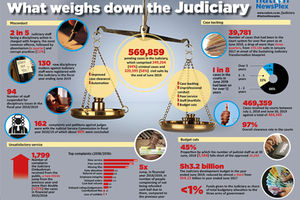
Kenya Medical Supplies Authority offices pictured in Embakasi, Nairobi, on December 10, 2024.
Amran Mohamed Ali was a negligent branch manager whose actions saw the National Hospital Insurance Fund (NHIF) lose over Sh200 million to two health facilities in Eastleigh through a fake claims scheme.
Ms Ali was fired on July 12, 2024, for failing to stop the scheme in which Amal Hospital and Beirut Pharmacy, under her Eastleigh branch jurisdiction, would either bill the NHIF for non-existent patients or log in expensive inpatient claims, for people who received routine or minor outpatient services. The fraud scheme was unearthed by Nation in 2023.
Despite being held responsible, by the NHIF and the courts, for the losses, taxpayers will have to pay Ms Ali an equivalent of three months’ salary for a few steps his former employer missed, and which count as a violation of Kenya’s labour laws.
High Court Judge Benard Manani on December 18 held that the NHIF was justified in firing Ms Ali as she slept on the job, hence ensuring the heist’s success.
But the judge faulted the NHIF for failing to issue Ms Ali with a notice to show why disciplinary action should not be taken against her, and which would have acted as a charge sheet to aid in responding to the issues raised.
The NHIF also failed to supply Ms Ali with the investigation reports that detailed her negligence.
On account of those two missteps, Ms Ali was awarded Sh833,430 for unfair termination.
“From the evidence on record, there is no indication that the claimant was issued with a notice to show cause letter, setting out the charges against her based on the results of the investigations. What she was issued with was a letter of interdiction, which alluded to suspected infractions which the respondents said required verification through investigations. As such, it is apparent that the claimant was not notified of the charges that were framed against her based on the results of the investigations,” Justice Manani ruled.
Scandals
“There is absolutely no data to suggest that either the entire of or excerpts from the report dated July 2023, were shared with the claimant,” the judge added.
Ms Ali’s case is just one of many, where government agencies have either missed a step in firing people responsible for scandals that cost taxpayers cash, or chosen the wrong fall guy. In such instances, the courts have pointed out the flaws by government agencies, and awarded money to the suing ex-civil servants for the labour law violations.
A few metres from Justice Manani’s court on December 18, another judge was presiding over a case linked to one of the country’s biggest scandals in recent times, and which cost taxpayers over Sh17 billion with nobody ever being prosecuted for the loss.
Justice Hellen Wasilwa opened the door for Charles Ezekiel Juma to auction assets owned by the Kenya Medical Supplies Agency (Kemsa) to recover Sh627,067 pension dues – the last of a Sh11.9 million payout from his former employer.
The pension dues stem from an out-of-court deal in which Kemsa agreed to pay Mr Juma Sh11.9 million, after realising that its former employee was likely going to win the wrongful termination suit he filed in 2023.
While serving as the Kemsa procurement director in 2020, Mr Juma signed several documents approving tenders for the supply of equipment and medicines intended to fight the Coronavirus.
By the time Nation revealed in September, 2020 that some unscrupulous individuals had exploited legal and internal Kemsa loopholes to supply goods and services at inflated prices, Mr Juma had approved tenders worth billions of shillings.
Auditor-General reports show that the taxpayer lost over Sh17 billion in the chaos that was Kemsa procurement.
Knee-jerk reactions followed, with President Uhuru Kenyatta ordering investigative agencies to ensure culprits were charged, regardless of their social status or blood relation to himself, within 21 days.
Further down the road, Kemsa decided to fire Mr Juma. After all, he was at the time one of the persons of interest in investigations by various institutions, including Parliament and the Ethics and Anti-corruption commission.
On April 24, 2024, the out-of-court deal Mr Juma and Kemsa signed a month earlier, was adopted as a court judgment upon the request of both parties. Kemsa was to pay Mr Juma Sh11.968 million inclusive of pension dues, and the court case would be marked as settled.
The State agency deposited Sh627,067 with the Kemsa staff retirement benefits scheme, which was against the deal registered in court. In June, Mr Juma sent auctioneers on Kemsa to recover the money.
His former employer begged the court to hold the auctioneers at bay, but Justice Wasilwa on December 18, ruled that the deal signed by both parties did not indicate that the retirement benefits due were to be paid in a specific pension scheme.
This means Mr Juma is now free to engage the auctioneers afresh, if Kemsa does not pay him the pension dues.
It also means that the State agency has to reverse the funds it deposited in Mr Juma’s account with the Kemsa staff retirement benefits scheme.
A month before the decisions by Justices Wasilwa and Manani, the Court of Appeal dismissed a case filed by the Judicial Service Commission (JSC), which failed to justify its dismissal of five accountants on suspicion of helping hackers steal Sh80 million.
Ruth Wanjiku Muraya, Grace Waithera Macharia, Boru Guyo Mole, Joab Ooko and Benjamin Mutuku Nzioka, were fired from the Judiciary after hackers tricked the Judiciary into paying several companies Sh80 million for fictitious services.
A hacker gang known to authorities as Forkbombo was behind the attack, after stealing passwords of the five accountants and using their credentials to approve the payments. Forkbombo used malware to obtain the passwords and access to the Judiciary’s systems.
Former Chief Justice Willy Mutunga interdicted the five accountants, and they were also charged in court with conspiracy to steal Sh80 million from the Judiciary. The five accountants were acquitted on January 10, 2020.
Half salaries
In August, 2021 the Judiciary served them with notices to show cause why they should not be fired, for allegedly failing to protect their passwords and leading to the Sh80 million loss.
The Human Resource Advisory Committee took into account investigation reports which showed that the hackers used malware, hence the accountants changing their passwords would not have stopped the theft.
The committee recommended that the five be absolved, their half salaries missed in the eight years of interdiction be paid. They were likely to return to work.
But on December 22, 2021, the JSC issued the five accountants with dismissal letters, faulting them for failing to protect their passwords.
The five sued the JSC, seeking reinstatement, and Justice Manani at the High Court ordered that they be allowed to return to work. The JSC challenged the decision at the Court of Appeal.
Justices Francis Tuiyott, Jessie Lesiit and Grace Ngenye found that the accountants had also been unfairly interdicted, as there was no investigative report linking them, directly or indirectly, to the theft.
The use of their passwords, the judges added, would have still happened on account of the malware.
“Both reports agreed that it was a malware which had been implanted long before the incident and it mattered not, whether the respondents changed their passwords, their details were captured overtime leading to the intrusion. Furthermore, the transfer of the monies took place on Friday night to Saturday morning when the respondents were not at work. In addition, the Committee noted in its report that other staff members were not interrogated whilst even one left the country,” the judges said in their decision.
They agreed with Justice Manani that reinstatement of the staff is still possible.
The JSC had said that the positions of the five accountants had already been filled.
But the appellate judges, much like Justice Manani, ruled that the Judiciary is a large organisation with the capacity to find a station for the five to work in.
“In addition, and crucially, no evidence was placed before the trial court that the positions the respondents held before their termination were no longer available. The remedy cannot therefore be said to be placing an onerous or burdensome responsibility on the appellant. Thus, we find no fault in the learned judge’s order of reinstatement,” Justices Tuiyott, Lesiit and Ngenye ruled.












